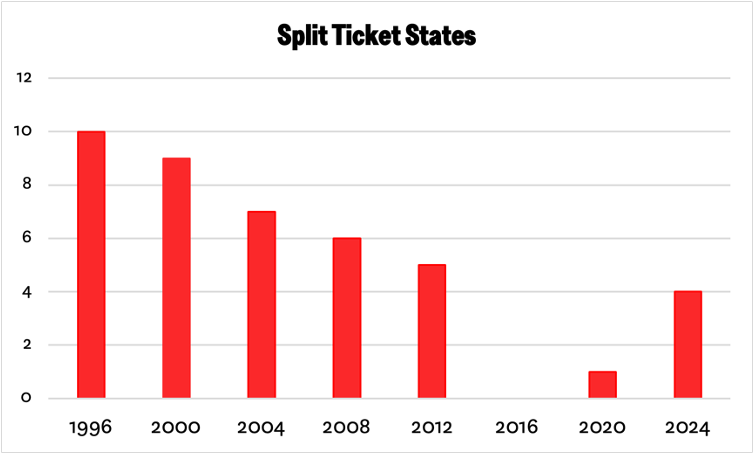The prevailing sentiment among pundits in the run-up to the 2024 election was that it would be a close contest between two evenly matched voter blocs of Republicans and Democrats, making it tough to know who won until every single vote was counted. At the presidential level, it didn’t work out that way—Donald Trump claimed victory in all seven swing states en route to the first popular vote win for a Republican candidate in two decades.
Yet something funny happened along the way. Democrats won a surprising number of Senate races in states that Trump carried. Voters in Arizona, Nevada, Michigan, and Wisconsin split their tickets between presidential and down-ballot Senate races, showing a willingness to cross party lines in ways that haven’t been common in recent years.
The numbers tell the story. In 2020, just one state—Maine—split its presidential and Senate results, supporting both Joe Biden and centrist Republican Sen. Susan Collins. In 2016, not a single state did. This year, voters in four states split their votes. This return to split-ticket voting suggests that, for many Americans, party loyalty and national politics took a backseat to candidates who reflected their values and spoke directly to their concerns about the economy, immigration, and cultural issues.
In Arizona, Ruben Gallego won a Senate seat even as Trump carried the state in the presidential race. Analysts attributed Gallego’s success to his ability to connect with Latino and working-class voters by speaking to the real-world concerns they face—in particular, border security, inflation, and economic stability.
In Michigan, Elissa Slotkin, a member of the House Problem Solvers Caucus captured a Senate seat in a state that also went for Trump, by focusing on relatable, everyday struggles—like her own family’s experiences with health care costs—and positioned her as an advocate against corporate excesses and out-of-touch economic policies. Next door in Wisconsin, Tammy Baldwin took a similar approach to her winning reelection campaign, demonstrating how a straightforward message from Democrats can resonate even in a state leaning red at the presidential level.
It’s no coincidence that many of these candidates embraced a commonsense message on economic issues while distancing themselves from extreme positions on cultural topics. As Cook Political Report’s Jessica Taylor noted in our latest edition of No Labels Talks, “When people can't afford groceries, they can't afford their mortgages, and they can't afford gas, that affects everything. And that just became the overarching concern.”
This approach has also helped Democratic and Republican gubernatorial candidates win in states that went to the other party’s presidential candidate, a trend that continued this year in states like North Carolina, New Hampshire, and Vermont.
The return of split-ticket voting in 2024 reinforces a central theme of No Labels’ work: Americans want leaders who put country over party. After two presidential cycles where Senate seats seemed inextricably linked to the candidate at the top of the ticket, more voters in swing states were willing to cross party lines to elect candidates they saw as authentic, grounded, and committed to real solutions. While we don’t yet know what the 2028 elections will have in store, this year marked a welcome return to a time when voters’ loyalty to a party took a backseat to practical solutions and relatable leadership.



Thank for this perceptive post. It once again shows the ultimate sensibility of the American voters to have divided government. The make up of congress, together with some of Trump's most recent cabinet nominees does not bode well for efficient and acceptable action in the next two years with regard to the most pressing National problems (debt, immigration, defense) unless the more moderate members of congress stick together and help forge compromises. 2026 will loom almost immediately when the new congress convenes so there will be lots of attention on "how do we retake or keep the House or Senate", hopefully not more attention than is needed to address our problems.
It is a return to a long missed era. Thanks for pointing that out. Dorsey